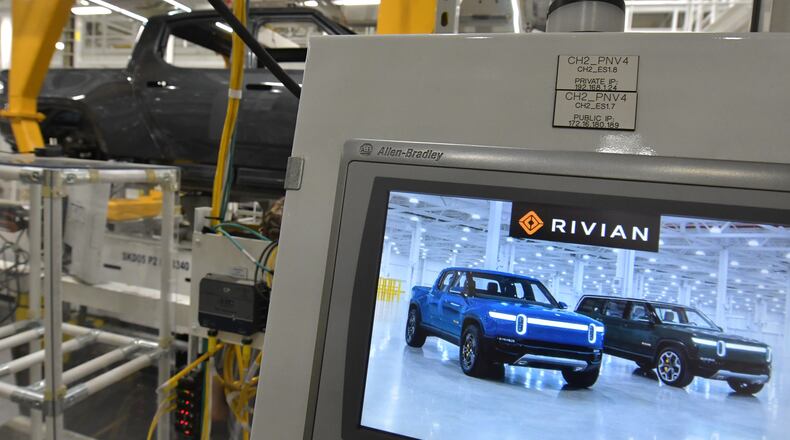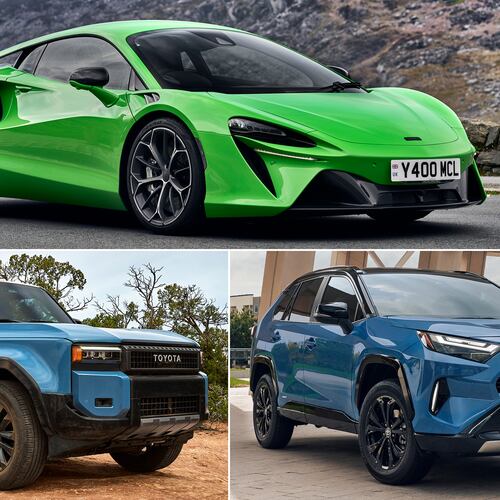Electric-vehicle maker Rivian had a busy second quarter, one that could prove pivotal for the startup and its promised $5 billion Georgia factory.
From April to June, the California-based automaker announced a partnership with Volkswagen that could ultimately be valued at up to $5 billion, a second generation of its flagship vehicle models and reiterated its future Georgia manufacturing plans — although the factory’s construction timeline remains unknown.
Despite three months of surprises and splashy announcements, the company’s manufacturing efforts in Illinois were more ho-hum. Rivian released its production and delivery figures Tuesday morning, which its leaders said come during a transition point for the company’s manufacturing capabilities.
Here is what you need to know about the company’s second quarter:
Down production
Rivian produced 9,612 vehicles during the three months ending in June, a 31% decrease from both a year ago and last quarter.
The manufacturing decline was anticipated because company leaders said production in Normal, Illinois, would be altered to incorporate various cost-cutting measures and technology improvements. Production is expected to increase during the second half of the year in order to meet the company’s goal of building 57,000 vehicles this year.
The Illinois factory has a production capacity of 150,000 vehicles, nearly triple its current output.
Credit: RON JOHNSON
Credit: RON JOHNSON
Deliveries begin to rebound
While production backslid, the number of customers who picked up a new Rivian vehicle increased.
The company delivered 13,790 vehicles during the past three months, a 9% increase from the same time last year and a 1% increase from the prior quarter. It means the second quarter was the first time in two years that Rivian delivered more vehicles than it manufactured during a financial quarter.
Deliveries peaked in the third quarter of 2023, which came just before EV manufacturers — namely Tesla — saw multiple down quarters of slowing demand. While EV sales have continued to increase, they have not met industry expectations, prompting some automakers to slow down their EV transition plans.
VW sees value in Rivian
In late June, Rivian and German automobile giant Volkswagen Group dropped a bombshell, announcing a potential $5 billion partnership.
VW plans to invest an initial $1 billion in Rivian, taking an equity position in the startup and becoming one of the company’s largest investors. The planned partnership includes $4 billion in additional investments through 2026, and would result in the developed software technologies being used in both companies’ future EVs.
Credit: Courtesy Rivian
Credit: Courtesy Rivian
Rivian CEO RJ Scaringe said the capital investment will help shore up the company’s balance sheet, support the launch of a new R2 crossover in Illinois and help make its planned Georgia factory a reality.
“This partnership does provide really a capital road map to not only secure and support the launch of R2 in Normal but also support the launch of that mid-size platform in our Georgia facility and our path to positive free cash flow,” Scaringe said after the June 26 announcement.
Georgia plans still in flux
Rivian’s planned Peach State plant is Georgia’s second-largest economic development project, promising 7,500 jobs and $5 billion in investment an hour east of Atlanta.
The factory site in southern Morgan and Walton counties has been graded and transferred to Rivian’s control, but the company announced in March it was pausing its construction plans to focus on launching the R2 in Illinois. Pausing the factory saved the company more than $2.2 billion in short-term development costs.
Credit: Miguel Martinez
Credit: Miguel Martinez
State and local officials offered a $1.5 billion incentive package to woo Rivian to Georgia. Most of the incentives, however, only accrue to Rivian if it collectively meets 80% of its promised jobs and investment by the end of 2030 and maintain those metrics through 2049. Otherwise, they’d be subject to clawback measures.
Cox Enterprises, which owns The Atlanta Journal-Constitution, also owns about a 3% stake in Rivian.
About the Author
Keep Reading
The Latest
Featured





